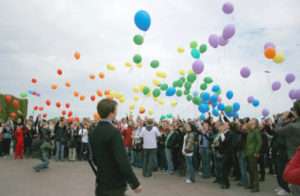
Alex needed a place to escape. With only one year left in his University studies, he could no longer stand the threats and physical violence he faced in his home country, even if that meant leaving his family, friends, and entire life in Russia behind.
Now, just a few years later, Alex, who did not want to use his full name, lives in Chicago, Illinois, where he works as a waiter and waits anxiously to hear the results of his asylum case. He fears that if has to return to Russia, he’s likely to be killed all because of his sexual orientation.
In over 70 countries around the world, it is illegal to be gay. Other countries, such as Russia, have laws that discriminate against and/or promote violence towards the LGBTQ community. Fear of persecution in these countries due to one’s sexual or gender orientation could be considered cause to seek asylum in the US.
While Alex submitted his asylum application in September 2015, he did not get called for his interview until November 2017. Now over a year later, he is still waiting to hear the results of his case. In the meantime, Alex is able to live and work in the US legally, but the future of his stay is uncertain.
“I feel lost right now, and nervous at the same time,” said Alex. “I’m sure one day I will open my mailbox and I will see the letter from USCIS but at the same time, you never know when it will happen.”
If his asylum claim is rejected, Alex and his lawyer will have to appeal the case, which could take another few years. If his appeal is denied, he must return to Russia, where he will be locked out of entering the US.
“I just want to create a family in the future,” said Alex. “Right now, I cannot even date anybody because I don’t know anything about tomorrow. I don’t want to get close to people, because what if tomorrow I’m sent home.”
Alex’s lawyer, Timothy Knudsen, worked with him to put together a case to show that he would be in danger if he were to return to Russia.
“If [an asylum client] says, hey, on this date, around this day, I got beat up at this subways stop in this city, I’ve gotta map out that subways stop, I’ve got to show their route to work,” said Knudsen. “It’s really small details. We’ve just got to prove to the US immigration office that it actually happened.”
Knudsen said that showing that the LGBTQ asylum seekers whom he has worked with will face danger if they return home is frighteningly easy.
“There’s been a lot of physical abuse in these cases,” said Knudson. “Usually they’ve been beaten up, when they showed their identity in some way, or threatened.”
In the past few months, the Trump administration has rescinded asylum protections granted to the victims of domestic violence. Knudson says this could indirectly harm some LGBTQ applicants, since domestic violence issues are often a part of their cases. But, the administration has yet to take any direct action to limit the number of LGBTQ applicants accepted into the US.
Another obstacle for asylum seekers can be the act of getting out of their native countries in the first place. Rainbow Railroad is a non profit organization that works to get LGBTQ people out of countries where they face persecution.
“Many of the people that we work with, they only come to us as a last minute thing,” said Eduardo Hernandez, a development officer for Rainbow Railroad. “They want to stay in their country and work for change, and be an advocate for change in their own country. They come to us when this is the end of the line for them.”
While getting those at risk out of their countries is the most urgent goal of Rainbow Railroad, ultimately the organization hopes to see a safer world for LGBTQ people, no matter where they are.
“We have a responsibility to think of LGBTQ people as a global community,” said Philip Wong, the director of development at Rainbow Railroad. “And as we talk about how to improve society, how to improve the world, one area LGBTQ people can really focus on is other queer folk. It’s really a simple equation.”
 >
>